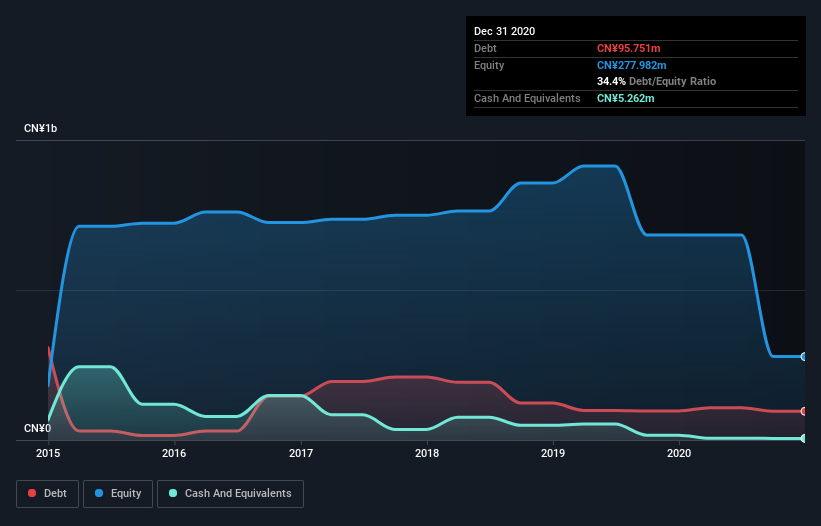- Hong Kong
- /
- Healthcare Services
- /
- SEHK:574
Is Pa Shun International Holdings (HKG:574) Using Too Much Debt?

The external fund manager backed by Berkshire Hathaway's Charlie Munger, Li Lu, makes no bones about it when he says 'The biggest investment risk is not the volatility of prices, but whether you will suffer a permanent loss of capital.' So it might be obvious that you need to consider debt, when you think about how risky any given stock is, because too much debt can sink a company. Importantly, Pa Shun International Holdings Limited (HKG:574) does carry debt. But the real question is whether this debt is making the company risky.
What Risk Does Debt Bring?
Debt and other liabilities become risky for a business when it cannot easily fulfill those obligations, either with free cash flow or by raising capital at an attractive price. Ultimately, if the company can't fulfill its legal obligations to repay debt, shareholders could walk away with nothing. However, a more usual (but still expensive) situation is where a company must dilute shareholders at a cheap share price simply to get debt under control. Having said that, the most common situation is where a company manages its debt reasonably well - and to its own advantage. The first thing to do when considering how much debt a business uses is to look at its cash and debt together.
Check out our latest analysis for Pa Shun International Holdings
What Is Pa Shun International Holdings's Debt?
As you can see below, Pa Shun International Holdings had CN¥95.8m of debt, at December 2020, which is about the same as the year before. You can click the chart for greater detail. On the flip side, it has CN¥5.26m in cash leading to net debt of about CN¥90.5m.

A Look At Pa Shun International Holdings' Liabilities
Zooming in on the latest balance sheet data, we can see that Pa Shun International Holdings had liabilities of CN¥200.3m due within 12 months and liabilities of CN¥24.9m due beyond that. Offsetting these obligations, it had cash of CN¥5.26m as well as receivables valued at CN¥82.2m due within 12 months. So its liabilities total CN¥137.7m more than the combination of its cash and short-term receivables.
When you consider that this deficiency exceeds the company's CN¥97.8m market capitalization, you might well be inclined to review the balance sheet intently. In the scenario where the company had to clean up its balance sheet quickly, it seems likely shareholders would suffer extensive dilution. When analysing debt levels, the balance sheet is the obvious place to start. But it is Pa Shun International Holdings's earnings that will influence how the balance sheet holds up in the future. So if you're keen to discover more about its earnings, it might be worth checking out this graph of its long term earnings trend.
Over 12 months, Pa Shun International Holdings made a loss at the EBIT level, and saw its revenue drop to CN¥475m, which is a fall of 44%. That makes us nervous, to say the least.
Caveat Emptor
Not only did Pa Shun International Holdings's revenue slip over the last twelve months, but it also produced negative earnings before interest and tax (EBIT). Its EBIT loss was a whopping CN¥17m. Considering that alongside the liabilities mentioned above make us nervous about the company. We'd want to see some strong near-term improvements before getting too interested in the stock. Not least because it burned through CN¥6.6m in negative free cash flow over the last year. That means it's on the risky side of things. When analysing debt levels, the balance sheet is the obvious place to start. But ultimately, every company can contain risks that exist outside of the balance sheet. Case in point: We've spotted 4 warning signs for Pa Shun International Holdings you should be aware of, and 2 of them are a bit unpleasant.
When all is said and done, sometimes its easier to focus on companies that don't even need debt. Readers can access a list of growth stocks with zero net debt 100% free, right now.
If you're looking for stocks to buy, use the lowest-cost* platform that is rated #1 Overall by Barron’s, Interactive Brokers. Trade stocks, options, futures, forex, bonds and funds on 135 markets, all from a single integrated account. Promoted
New: Manage All Your Stock Portfolios in One Place
We've created the ultimate portfolio companion for stock investors, and it's free.
• Connect an unlimited number of Portfolios and see your total in one currency
• Be alerted to new Warning Signs or Risks via email or mobile
• Track the Fair Value of your stocks
This article by Simply Wall St is general in nature. It does not constitute a recommendation to buy or sell any stock, and does not take account of your objectives, or your financial situation. We aim to bring you long-term focused analysis driven by fundamental data. Note that our analysis may not factor in the latest price-sensitive company announcements or qualitative material. Simply Wall St has no position in any stocks mentioned.
*Interactive Brokers Rated Lowest Cost Broker by StockBrokers.com Annual Online Review 2020
Have feedback on this article? Concerned about the content? Get in touch with us directly. Alternatively, email editorial-team (at) simplywallst.com.
About SEHK:574
Pa Shun International Holdings
An investment holding company, engages in the pharmaceutical distribution and manufacturing business in the People’s Republic of China.
Low and slightly overvalued.
Market Insights
Community Narratives



